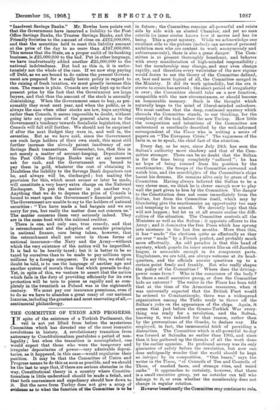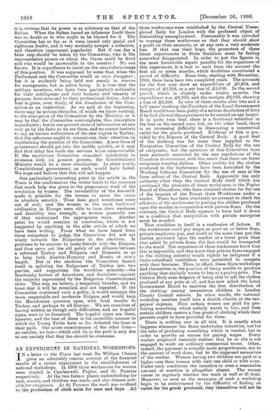THE COMMITTEE OF 'UNION AND PROGRESS.
IN spite of the existence of a Turkish Parliament, the veil is not yet lifted from before the mysterious Committee which has directed one of the most romantic revolutions in history. A revolutionary transition from autocracy to Constitutionalism postulates a period of non- legality ; but when the transition is accomplished, one . would expect that those who were the temporary and irregular depositaries of power—very admirable deposi- taries, as it happened, in this case—would regularise their position. It may be that the Committee of Union and Progress means to do this as soon as possible, and we should be the last to urge that, if there are serious obstacles in the way. Constitutional theory in a country where Constitu- tionalism is little understood should be made a fetish, and that both convenience and expediency should bow down to it. But the news from Turkey does not give a scrap of evidence as to what the function of the Committee is to be in future ; the Committee remains all-powerful and exists side by side with an elected Chamber, and yet no man outside its inner circles knows bow it moves and has its being. This a great mystery. While we acknowledge one' excellent side to the picture (nobody can accuse of personal' ambition men who are content to work anonymously and subterraneously), there is also a great danger. The Corn-' mittee is at present thoroughly beneficent, and behaves with every manifestation of high-minded responsibility;' but the membership may change, and may even change rapidly, and therefore every wellwisher of the new regime would desire to see the theory of the Committee defined, or, best and most logical of all, the Committee merged in the Ministry. It did its work splendidly, but the era it strove to create has arrived ; the short period of irregularity is over ; the Committee should take on a new function, compatible with the new circumstances, or should become an honourable memory. Such is the thought which naturally leaps to the mind of liberal-minded onlookers. We must confess that the deep, continued mystery which shrouds the Committee stands, to our thinking, for the complexity of the task before the new Turkey. How little the composition and intentions of the Committee are understood is excellently described by the well-informed correspondent of the Times who is writing a series of papers on "The European Crisis." The vagueness of the facts is, so to speak, the chief fact of the situation.
Every day, as he says, since July 24th has seen the Sultan's authority more shadowy and that of the Com- mittee stronger. There can be no doubt that the Sultan is for the time being completely " collared " ; he has no hope of being rescued from his position by the reactionaries ; the troops of the Committee surround and watch him, and the searchlights of the Committee's ships haunt his dreams. He remains alive only by grace of the Committee. Having always believed the Sultan to be a very clever man, we think he is clever enough now to play well the part given to him by the Committee. The danger to the Constitution does not come immediately from the Sultan, but from the Committee itself, which may by blundering give the reactionaries an opportunity too easy and tempting to be missed. We devoutly hope that this will not happen ; but let us at all events realise the diffi- culties of the situation. The Committee controls all the Ministers as well as the Sultan ; it appoints officers to the Army ; and it dominates the free Press which has sprung into existence in the last five months. More than this, it has " made " the elections quite as effectually as they are ever " made " by a French prefect, and probably much more effectually. An odd paradox is that this band of mystery, which guards its inner secrets like an old Jacobite league, is accessible enough in its component parts. Englishmen, we are told, are always welcome at its head- . quarters, and the officials answer questions up to a certain point freely and frankly. But who really shapes the policy of the Committee ? Where does the driving.' power come from ? Who is the conscience of the body ? Is there a small executive group, or does the Committee hide an autocrat ? The writer in the Times has been told that at the time of the Armenian massacres, when it' was universally expected that the British Fleet would be ordered to Constantinople, there was a widespread organisation among the Turks ready to throw off the Sultan's yoke on the appearance of the ships. Again, it seems that just before the Graeco-Turkish War every- thing was ready for a revolution, and the Sultan, knowing it, was induced for that reason, rather than by the provocations of the Greeks, to declare war. He' employed, in fact, the immemorial trick of providing a distraction. The Committee which is all-powerful to-day' was formed at Salonika no earlier than 1905, and since then it has gathered up the threads of all the work done by the earlier agencies. Its profound secrecy was its only guarantee of safety before the revolution, but now one does unfeignedly wonder that the world should be kept so intrigue by its composition. "One hears," says the writer in the Times' "of Councils of Ten and Councils of Three, of masked faces, and strange rites, and weird oaths." It approaches to certainty, however, that there. is a small executive group, yet no outsider can tell who belongs to it, or even whether the membership does not change in regular rotation.
However beneficently the Committee may continue to rile,
it is obvious that its power is as arbitrary as that of the Sultan. When the Sultan issued an infamous 'rade there was no doubt as to who ought to be blamed for it. The Committee has so far, as it were, issued only genial and righteous Ludes, and it very modestly accepts a collective, and therefore impersonal, popularity. But if one day a false step should be taken by the Committee, who is the representative person on whom the blame could be fixed and who would be answerable to the country ? No one knows. It is superfluous to insist on the unsatisfactoriness of this position. It was supposed by some that when the parliament met the Committee would at once disappear ; but it is evidently being held not merely in reserve for emergencies, but in active being. It is true that the military members, who have been particularly noticeable for their intelligence and their honesty and tenacity of purpose, have returned to their professional duties ; but no hint is given, even dimly, of the dissolution of the Com- mittee as an institution. As we said at the beginning, there may be serious obstacles, of which we know nothing, to the absorption of the Committee by the Ministry, or it may be that the Committee contemplates this absorption immediately; but in our present state of information we can only go by the facts as we see them, and we cannot hesitate to say, as sincere wellwishers of the new regime in Turkey, that the reformers ought to concentrate their attention on regularising the position of the Committee. A new form of government should get into the saddle quickly, or it may bud that delay has made the nervous horse unmountable. li the mysterious Committee remained indefinitely in existence with its present powers, the Constitutional Ministry would be a mere simulacrum. In other words, Constitutional government, as such, would have failed. We hope and believe that this will not happen.
One particularly interesting point in the article in the Times is the confirmation the writer lends to the rumours that much help was given in the preparatory work of the revolution by women. The inviolability of the haremlik wade it possible for the women to serve the cause in absolute security. Thus does good sometimes come out of evil; and the women in the most backward civilisation in Europe were able to turn their weakness and disability into strength, as women generally can if they understand the appropriate ways. Another point we would mention in conclusion, which is not suggested by anything in the able article of which we have been writing. From what we have heard from those competent to judge, the Committee did not act wisely towards the Bulgarians in the elections. It professes to be anxious to make friends with the Bulgars, and thus carry out the old policy of an alliance between a reformed Turkey and Bulgaria and Rumania so as to keep both Austria-Hungary and Russia at arm's length. But at the elections the Committee busied itself in splitting the Bulgarians of Turkey into two parties, and supporting the worthless minority—the Sandansky faction of Anarchists and Socialists—against the majority represented by the Bulgarian Constitutional clubs. This was, we believe, a temporary blunder, and we trust that it will be remedied, and not repeated. If the Committee continued such a policy, it would estrange the more respectable and moderate Bulgars, and would keep the Macedonian question open, with fatal results to Turkey, and perhaps to all Europe. We are conscious of having written as though only difficulties, and no hopeful signs, were to be discerned. The hopeful signs are there, however, and the best of them is the incredible manner in which the Young Turks have so far defeated the lions in their path. Our acute consciousness of the other lions— no smaller, we fear—which still lie in the path is only due to our anxiety that they too should be overcome.







































 Previous page
Previous page